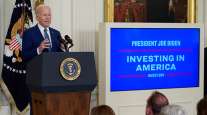Staff Reporter
Policymakers Raise Issue of Federal Oversight in Infrastructure Investments

[Stay on top of transportation news: Get TTNews in your inbox.]
Congressional transportation officials are raising the issue of oversight in how states will spend $1.2 trillion in federal infrastructure funding.
Reps. Sam Graves (Mo.) and James Comer (Ky.), both Republicans, cited concerns about avoiding wasteful or fraudulent spending in a letter they sent March 3 to Mitch Landrieu, the White House senior adviser and infrastructure coordinator leading the Biden administration’s implementation of the Infrastructure Investment and Jobs Act, which Biden signed into law in November.
“This massive spending bill is in large part a combination of lump sums broadly categorizing what money must go toward which, unfortunately, leaves the door open for the administration to pursue their ‘woke’ priorities rather than allocating the funds based on states’ actual needs. The expansive purpose for which the funds were allocated, along with the magnitude of the expenditure, create a greater-than-usual opportunity for corruption and wasteful spending,” the letter declared.
BREAKING@RepJamesComer & @RepSamGraves call on White House Infrastructure Czar Mitch Landrieu to provide all information on how the $1.2 trillion infrastructure funding is being spent.
We must protect taxpayers’ money from waste, fraud, and abuse.https://t.co/0pUsn2m0BP — Oversight Committee Republicans (@GOPoversight) March 3, 2022
Graves is ranking member of the House Committee on Transportation and Infrastructure, while Comer is ranking member of the House Committee on Oversight and Reform. They requested documents and information to determine if the infrastructure funds are being spent effectively and efficiently.
Graves also joined Del. Eleanor Holmes Norton (D-D.C.) on March 2 during a meeting with state highway and transportation officials in Washington, D.C. to discuss congressional oversight of how states choose infrastructure projects, especially now that the federal government has granted flexibility in how funds are spent.

Holmes Norton
“What I worry about is the waste and the fraud and the abuse that can come from so much money being thrown out toward so many different things and taking those guardrails off,” Graves told attendees during the 2022 AASHTO Washington Briefing, held March 1-4 by the American Association of State Highway and Transportation Officials. “It’s going to be up to you all. That’s a lot of what you do, obviously, is to keep those projects moving forward and hopefully keep them on track and keep them under budget.”
Holmes Norton reminded the AASHTO audience that her subcommittee will be monitoring how infrastructure investment programs are implemented and expended.
“You can help us with that,” she added. Holmes Norton is chairwoman of the House Transportation and Infrastructure Subcommittee on Highways and Transit.
She said states are able to apply federal dollars to projects that make sense in local communities, but implementation guidance is needed from the U.S. Department of Transportation.
“Flexibility is not the same as complete autonomy to use federal dollars, however,” Holmes Norton said. “Through your implementation efforts, we can transform the places where Americans live and work to create a better world for future generations.”
States’ spending flexibility was also raised by Transportation Secretary Pete Buttigieg during a March 3 address at the AASHTO event.
“I want you to know I recognize the value and importance of your flexibility to effectively deploy the resources coming through this infrastructure law. I can commit that we will work with you to make sure that you have the right level of flexibility consistent with the infrastructure law and with the core priorities that guided its creation and guide our administration,” he said.
Buttigieg urged state authorities to be guided by future needs when selecting projects and avoid relying on what worked in the past.
“We know there are many different ways to get to the goals that we share, and there is no one size that fits all. I trust that you’ll exercise that flexibility with the knowledge of how much it matters what projects you choose to prioritize,” he said.
Want more news? Listen to today's daily briefing below or go here for more info:




